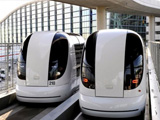|
|
TODAY.AZ / Weird / Interesting
Driverless pod cars transport passengers around London's Heathrow Airport
10 August 2011 [18:51] - TODAY.AZ
 Driverless cars are just catching on in this country, but they’re already zooming around London’s main airport, ferrying passengers from their people-driven cars to the terminal.
Driverless cars are just catching on in this country, but they’re already zooming around London’s main airport, ferrying passengers from their people-driven cars to the terminal.Twenty-two of these automated pods are operating at Heathrow’s Terminal 5, the shiny new terminal occupied by British Airways. They were built to replace a duo of diesel buses that formerly drove in a loop from the car parks to the terminal, pausing at various stations no matter how many people were present.
The electric-power pods, which can accommodate up to four travelers and their bags, travel up to 25 mph along 2.4 miles of paved guideways, which can be customized to fit any path. They don’t require a special railway or magnetic field — just lines that can be used for optical navigation. The pods can even maneuver through light snow, according to their manufacturer, ULTra PRT. The New York Times says the autonomous pods have not been in any accidents.
The first trials started in April, and service became fully operational this summer when the buses were removed from rotation, the Times says.
Passengers have to press "start" when they get in, to ensure efficiency and to prevent people from making the pods move while they’re empty. About 800 people per day use the pods, the Times says.
According to the ULTra, American travelers might see them soon, too. The systems are under review by airports in California and New York; transit systems in California, Oregon and Tyson’s Corner, Va., a Washington, D.C., suburb; downtown Calgary; and even in Mountain View, Calif., where Google and NASA workers battle congestion.
The pods are cheaper than high-speed rail, which might make them attractive to cash-strapped cities. Passengers like them because they’re more convenient than checking transit timetables, ULTra says — the pods come to you, rather than you waiting for them. But the best part may be their simplicity: With a customizable guideway system, they could even be used on regular roads, meaning pods like this could be an easy way to integrate driverless vehicles into commuters’ lives.
/Popular Science/
URL: http://www.today.az/news/interesting/92223.html
 Print version
Print version
Views: 1668
Connect with us. Get latest news and updates.
See Also
- 05 February 2025 [19:41]
Japan plans to negotiate with Trump to increase LNG imports from United States - 23 January 2025 [23:20]
Dubai once again named cleanest city in the world - 06 December 2024 [22:20]
Are scented candles harmful to health? - 23 November 2024 [14:11]
Magnitude 4.5 earthquake hits Azerbaijan's Lachin - 20 November 2024 [23:30]
Launch vehicle with prototype of Starship made its sixth test flight - 27 October 2024 [09:00]
Fuel prices expected to rise in Sweden - 24 October 2024 [19:14]
Turkiye strikes terror targets in Iraq and Syria - 23 October 2024 [23:46]
Kazakhstan supplied almost entire volume of oil planned for 2024 to Germany in 9 months - 23 October 2024 [22:17]
Taiwan reported passage of Chinese Navy aircraft carrier near island - 23 October 2024 [21:50]
Russia remains largest oil supplier to India
Most Popular
 Foreign Ministers of China, South Korea and Japan hold meeting in Tokyo
Foreign Ministers of China, South Korea and Japan hold meeting in Tokyo
 Istanbul Airport witnesses growth in number of passenger & cargo traffic
Istanbul Airport witnesses growth in number of passenger & cargo traffic
 MÜS?AD outlines strategic steps for economic resilience
MÜS?AD outlines strategic steps for economic resilience
 The Trans-Caspian route in the mirror of Azerbaijani-Chinese relations
The Trans-Caspian route in the mirror of Azerbaijani-Chinese relations
 Armenians begged Snoop Dogg for budget money
Armenians begged Snoop Dogg for budget money
 Azerbaijan files arbitration claim against Armenia over environmental destruction
Azerbaijan files arbitration claim against Armenia over environmental destruction
 Alain vs Samvel: Circus on the wreckage of the "struggle"
Alain vs Samvel: Circus on the wreckage of the "struggle"
